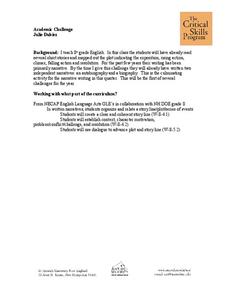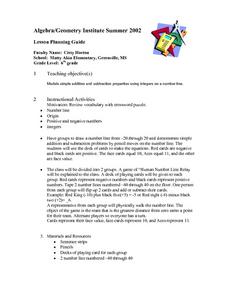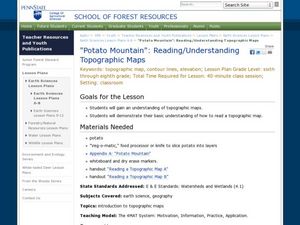Curated OER
Character's Qualities
Sixth graders analyze the a character's qualities and the effects of these qualities on the plot and the resolution of the conflict in the story "The Pigman and Me." They develop a list of the qualities, discuss if these qualities were...
Curated OER
Sam and the Lucky Money
Third graders read the story "Sam and the Lucky Money". Individually, they identify new key terms from the story. In groups, they examine the setting and discuss how it relates to the plots and characters. To end the lesson, they read...
Curated OER
"Thunder Butte"
Sixth graders review as a class the story "Thunder Butte". Together they write an outline of the story following the sample and then pick four main parts of the story giving supporting details for each one. They compare Sarah's view with...
Curated OER
Acrostic Poems
Second graders listen to the book, SHARK WATCH as it is read to the class and name some of the facts they have learned about sharks from hearing the story. They then write an acrostic poem on the topic of sharks. Some of the students...
Curated OER
Chinese New Year
Third graders discuss with the teacher what they know about the Chinese New Year and then watch a video on the topic. They then discuss what they learned about Chinese New Year and then they refer to their January booklet to cut out a...
Curated OER
Comparison between Wampanoag and Pilgrims
Second graders compare and contrast the lives of Pilgrims and Wampanoag. Students conduct research using an interactive website and collect information about each group. Students then decide which they would rather be, a Pilgrim or a...
Curated OER
Patriots and Loyalists
Fifth graders take a clear stance on the Revolutionary way by choosing the side of the patriot or loyalist. They compare and contrast the positions of both the loyalists and the patriots using a graphic organizer. Using the information...
Curated OER
Saving the Titanic
Students research the Titanic using fiction, nonfiction, images, and Internet based resources. They determine if it is appropriate to raise and save the Titanic and its artifacts before planning and writing an opinion piece which defends...
Curated OER
Triangles and Quadrilaterals
Second graders explore triangles and quadrilaterals. They rotate to various centers in the room to identify and examine triangles and quadrilaterals. After presenting a picture to the class, 2nd graders locate right angles, triangles...
Curated OER
Short "u" vowel
First graders successfully build words containing the short "u" vowel. They connect letter cards with an accuracy of 90%. Students build on phonics as well. They encounter within this instructional activity sequencing.
Curated OER
Historical Fiction: A Wealth of Interpretations
Students read a book from the Dear America series and contrast different points of view. They respond to the book either by participating in a literature circle or completing a journal entry. They compare and contrast two books or a...
Curated OER
Let's Explore the World of Triangles and Quadrilaterals!
Second graders explore the features of triangles and quadrilaterals. In this lesson on triangles and quadrilaterals, 2nd graders rotate with their group to five different activities all exploring a different aspect of geometry.
Curated OER
Drawing Into the Imagination
Sixth graders create a non linear story with multiple possibilities and endings. In this non linear story lesson plan, 6th graders research non linear stories, create their own, and illustrate it.
Curated OER
Free Reading Project
Students participate in a free reading project to improve their reading skills. In this reading project lesson plan, students spend 30 minutes reading each day and complete journal entries for the lesson plan. Students complete a short...
Curated OER
Storytelling
Students compose a story and tell it to the class. In this storytelling lesson, students work in small groups to create an illustrated story. Students are given a checklist of elements to include in the...
Curated OER
Equivalent Fraction Licorice
Young scholars discuss the meaning of "equivalent" and look for similarities in a bag of pre-cut licorice given to their group. For this math lesson, students experiment with making equivalent pieces of licorice from other pieces. Young...
Curated OER
Farm Animals And Food They Eat
Students identify farm animals by the sounds they make and draw the animal and type of food they eat. In this farm animals lesson plan, students read the book Barnyard Song and view baggies of animal food.
Curated OER
Addition & Subtraction Properties With Integers
Sixth graders use a number line to solve addition and subtraction problems. In groups, they play a game of "Human Number Line Relay." They use a deck of cards to randomly create addition and subtraction equations and physically walk a...
Curated OER
Mean, median, and mode... Use the data
Ninth graders participate in a instructional activity focused on the concept of basic statistics. They find the mean, median, and mode of different data sets. More advanced students could practice creating a bell curve from the data.
Curated OER
"Potato Mountain": Reading/Understanding Topographic Maps
Students investigate how to read topographic maps. In this map reading lesson students complete a topographic map activity.
Curated OER
Lincoln Meets Gates
Students research historical figures and create presentations for their research using technology tools. In this historical figures lesson, students use the provided links to research historical figures in America. Students then use...
Curated OER
Teaching Money
Pupils identify coin/money values, write amounts of money and calculate change. The poem, "Smart" by Shel Silverstein is used in this lesson.
Curated OER
Outside - Inside Drawings
Students use observational drawing to study the unfamiliar They use oil pastels to mix/blend colors. They be introduced to using drawing as a tool for documenting what we can learn from close observation.
Curated OER
Cruising the Caribbean
Seventh graders create four postcards that illustrate an island on the Caribbean.























